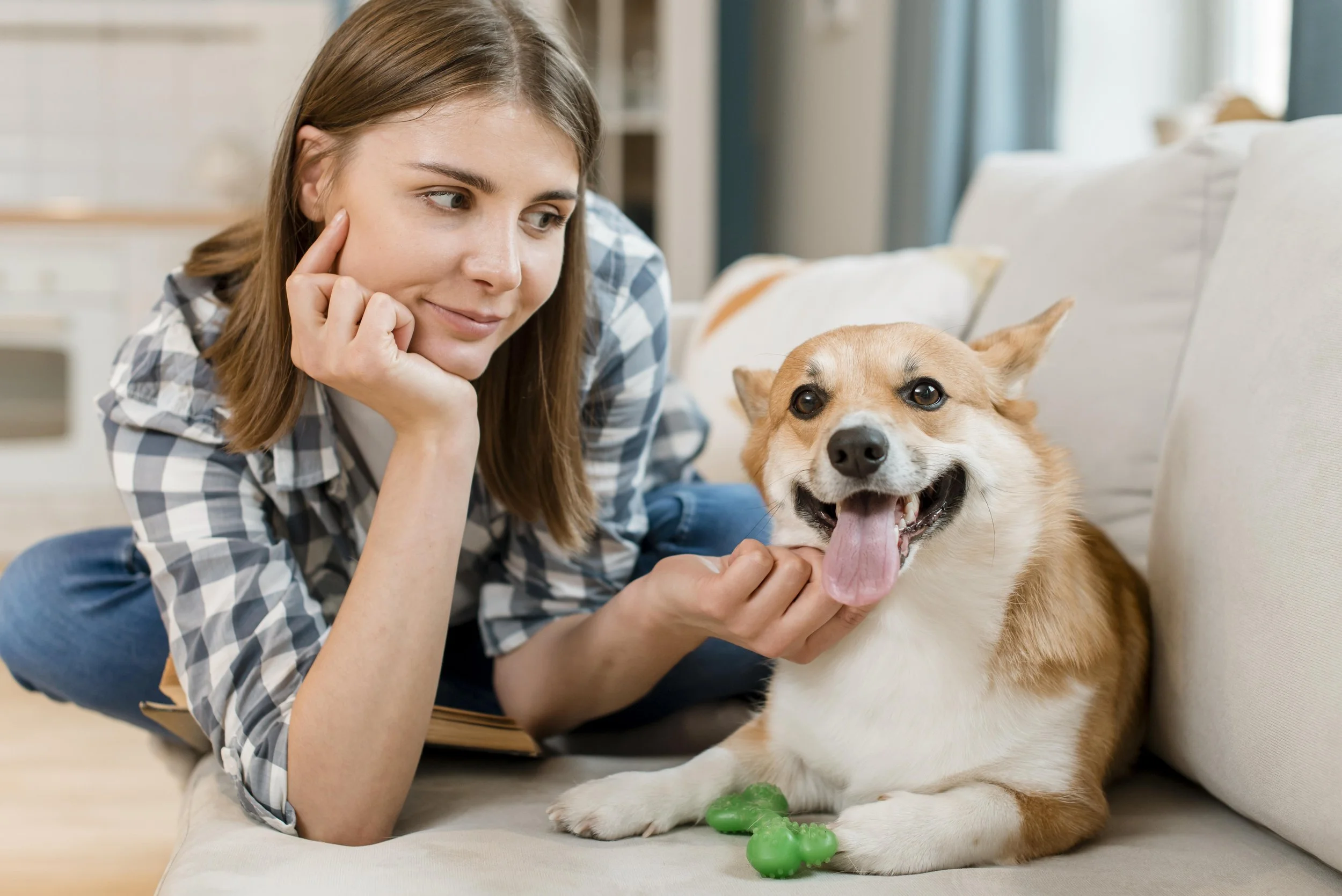Why Does Your Puppy Keep Biting You?
Ouch! Those tiny needle-sharp teeth have found your fingers again, haven't they? If you're wondering why your puppy keeps biting you, you're definitely not alone in this bitey journey. At Kindred Dog PDX, we hear this question from new puppy parents almost daily, and we're here to help you understand this perfectly normal (albeit painful!) phase of puppyhood. That’s why we’ve come up with this blog for you.
Here's what you'll discover in this comprehensive guide to puppy biting behavior:
• The natural reasons behind puppy biting behavior and when it typically occurs during your pup's development.
• Practical training methods to redirect biting into appropriate play and calm behavior that actually work.
Don't worry, your precious pup isn't destined to become an aggressive dog. This mouthy phase is completely normal, and with the right approach, you'll have a well-mannered companion who knows how to play gently.
Understanding Why Puppies Bite Is the First Step to Solutions!
Before we dive into training techniques, let's explore the why behind your puppy's bitey behavior. Understanding the root causes will help you respond with patience and effectiveness rather than frustration.
Teething Discomfort Creates Constant Urges to Chew
Just like human babies, puppies experience significant discomfort during their teething process. Teething discomfort drives puppies to chew and bite on everything, including human skin, as their adult teeth emerge between 3-6 months of age. During this phase, your puppy's gums are sore, swollen, and incredibly itchy.
Think about it from your pup's perspective when your gums hurt, anything that provides pressure and relief feels good, even if it's your hand or arm! This biological need to chew isn't something your puppy can simply "turn off," which is why providing appropriate outlets becomes so crucial for teething puppy solutions.
Natural Exploration Through Mouth-First Investigation
Puppies naturally explore their world through their mouths and learn bite inhibition through play with littermates before coming home with you. Unlike humans, who rely primarily on their hands to investigate new objects, puppies use their mouths as their primary exploration tool.
When your 8-week-old puppy first arrives home, they've only had limited time with their siblings to learn proper bite inhibition, the ability to control the pressure of their bite. In the wild or in responsible breeding situations, littermates provide immediate feedback when play gets too rough, teaching each other appropriate pressure levels through squeaks, yelps, and temporary withdrawal from play.
Normal Puppy Development Includes Mouthy Behavior
Let's normalize something important right away: mouthy behavior is a completely expected part of healthy puppy development. Your puppy isn't being "bad" or "aggressive" they're simply acting like a normal, developing dog.
Play Biting Teaches Important Social Skills
Play biting mimics how puppies interact with siblings and teaches them appropriate pressure levels through feedback from their playmates. When puppies play together, they engage in mock fighting, wrestling, and yes – lots of gentle biting and mouthing.
This type of play serves several important developmental purposes:
Learning to moderate bite pressure
Developing social communication skills
Building confidence and resilience
Practicing important motor skills
Releasing energy in appropriate ways
When your puppy mouths you during play, they're essentially inviting you into their natural social repertoire. The key is teaching them that human skin is much more sensitive than their furry siblings!
Attention-Seeking Behavior Gets Results (Unfortunately!)
Here's where many well-meaning puppy parents accidentally reinforce the very behavior they want to stop. Attention-seeking behavior often manifests as biting when puppies learn that it gets immediate reactions from their humans.
Picture this scenario: Your puppy bites your hand, you yelp dramatically, maybe even pull your hand away quickly while saying "No, bad puppy!" From your puppy's perspective, jackpot! They just discovered a foolproof way to get your immediate, undivided attention. Even negative attention feels rewarding to a social creature who craves interaction.
This is why understanding the puppy training approach we use at Kindred Dog PDX focuses heavily on positive reinforcement and strategic attention management.
Effective Training Techniques to Stop the Biting Cycle
Now, for the part you've been waiting for practical and proven techniques to stop the puppy from biting! These methods work because they address the underlying needs driving the behavior while teaching your puppy more appropriate ways to interact.
Immediate Redirection Creates New Habits
The moment you feel those teeth, redirect biting to appropriate toys immediately while saying "no bite" in a calm, firm voice. This technique works because it:
Acknowledges your puppy's need to mouth and bite
Provides an appropriate outlet for that energy
Creates a positive association with acceptable chewing objects
Teaches your puppy what they should do instead of just what they shouldn't
Keep a variety of textures available rope toys, rubber toys, soft plush toys, and even frozen washcloths for teething relief. The key is consistency and having appropriate alternatives within reach at all times.
Strategic Withdrawal Teaches Boundaries
One of the most powerful tools in your training toolkit is learning when to disengage. Remove yourself from play and ignore your puppy for 30 seconds when biting occurs to teach clear boundaries about acceptable behavior.
This technique mimics what would happen in natural puppy play when one puppy bites too hard; the other stops playing immediately. Here's how to implement this effectively:
The moment teeth touch skin, say "ouch" in a neutral tone
Immediately stop all interaction and turn away
Count to 30 while completely ignoring your puppy
Resume gentle play only when your puppy is calm
Repeat consistently every single time
Remember, this temporary withdrawal isn't punishment, it's education about natural consequences.
Creating a Bite-Free Environment Takes Consistency
Training success depends heavily on creating an environment that sets your puppy up for success while providing consistent messages from every human in the household.
Family Consistency Prevents Mixed Messages
Ensure all family members respond to biting the same way to avoid confusing mixed signals that can actually prolong the biting phase. Dogs thrive on predictable patterns, and inconsistency between family members creates confusion and slower progress.
Hold a family meeting to discuss:
Agreed-upon verbal cues ("no bite," "gentle," etc.)
Consistent redirection techniques
Timeout procedures
Appropriate toys and their locations
Who's responsible for training sessions
When everyone responds the same way, your puppy learns faster and experiences less stress during the learning process.
Environmental Management Supports Success
Provide plenty of appropriate chew toys and rotate them regularly to keep your puppy engaged with acceptable outlets for their natural chewing instincts. Think of this as environmental enrichment that prevents problematic behaviors before they start.
Create "chew stations" throughout your home:
Living room toy basket with 3-4 rotating options
Kitchen chew toy for mealtime supervision
Bedroom toy for quiet time
Outdoor toys for yard play
Rotating toys every few days maintains novelty and interest, making appropriate items more appealing than your hands and clothes.
When to Seek Professional Help
While most puppy biting behavior resolves with consistent training, some situations benefit from professional guidance. Consider reaching out to experienced trainers like our team at Kindred Dog PDX if:
Biting intensity increases rather than decreases over time
Your puppy shows signs of resource guarding around toys or food
Multiple training approaches haven't shown progress after 4-6 weeks
You're feeling overwhelmed or frustrated with the process
Your puppy's biting seems fear-based rather than playful
Understanding that puppy biting is normal development combined with consistent training creates a well-behaved companion who knows how to interact appropriately with humans of all ages.
With patience and the right techniques, your bitey puppy will learn to play gently and show affection in appropriate ways. Remember, this phase truly is temporary. Most puppies show significant improvement by 4-5 months of age when their adult teeth have fully emerged and they've mastered bite inhibition through consistent practice.
Frequently Asked Questions
-
Most puppies show significant improvement in their bite inhibition by 4-5 months of age, with the most intense biting phase occurring between 8-16 weeks. However, individual puppies may vary based on their breed, early socialization experiences, and consistency of training. The teething phase generally peaks around 3-4 months and begins to subside as adult teeth fully emerge by 6 months.
-
Absolutely! Teething discomfort often intensifies biting behavior temporarily. Your puppy's gums are sore and swollen, making them seek out more pressure to relieve discomfort. This is why providing frozen toys, cold washcloths, and appropriate chew items becomes even more crucial during peak teething periods. The behavior should improve as adult teeth fully emerge.
-
While bitter apple spray can help prevent furniture chewing, it's less effective for puppy play biting because the behavior is social rather than purely about taste preferences. Focus instead on redirection to appropriate toys and strategic attention wihdrawal. If you do use deterrent sprays, ensure they're pet-safe and use them only on objects, never directly on your puppy.
-
Puppy play biting typically involves a relaxed body posture, play bows, bouncy movements, and an overall happy demeanor. The puppy usually releases pressure when you yelp and may even lick afterward. Aggressive biting, while rare in young puppies, involves stiff body language, growling, raised hackles, and intense staring. If you're ever concerned about aggressive behavior, consult a professional trainer immediately.
-
Yes, though it may require more patience and consistent work on your part. Puppies separated before 8 weeks miss crucial socialization experiences with siblings, but humans can still teach bite inhibition effectively. Focus heavily on the "ouch and withdraw" method, provide plenty of appropriate chew toys, and consider enrolling in puppy socialization classes where your pup can learn from other well-behaved dogs.
Ready to transform your bitey puppy into a gentle companion? Contact Kindred Dog PDX today for personalized puppy training solutions that work with your family's lifestyle and your puppy's unique personality!


